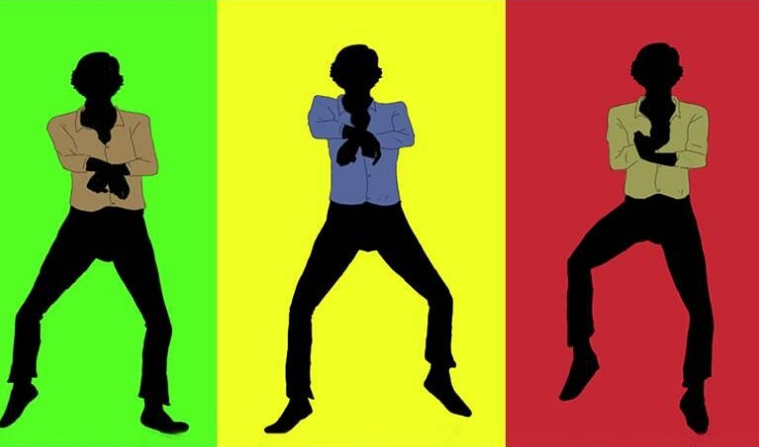In 2017, Olamide took the fourth edition of his annual OLIC concert to the mainland for the first time; it’s obvious that the rap superstar has outgrown Eko Hotel’s overused Convention Center. The timely relocation granted ‘home advantage’, of sorts, not only to the King of the Streets but also to the underground acts he customarily gives a platform to, as they performed in their natural habitat.
One of those acts was DJ Real, who’d built a solid reputation for hosting mixtapes containing the biggest street anthems, and for his work on local radio. He’s also largely credited for having a hand in the rise of Small Doctor through the Alaba circuit. DJ’s like Real are an important, but often overlooked, part of how street movements bubble to the surface and they are the platform through which street artists typically get their first look.
The diminutive DJ is, however, not to be mistaken for Mr. Real, the artist behind the street anthem “Legbegbe” (featuring Idowest, Obadice and Kelvin Chuks), who also performed at OLIC 4 and has played a significant role in the spread of a new viral dance called “shaku shaku”.

Mr. Real, D’banj and Slimcase
Another artist who performed at OLIC 4 was Slimcase, an artist who’d featured on DJ Real’s mixtape and was part of 2 of the biggest street records of 2017 – DJ Sidez’ “Oshozondi” and Idowest’s Omo Shepeteri”. It’s no surprise that Teslim Balogun stadium erupted when he stepped on stage to perform those street anthems, he too was instrumental in the organic growth of shaku shaku.
Shaku shaku is a dance step that’s performed by crossing your arms in front of each other at the wrist, widening your legs slightly, and launching into a graceful half-gallop. The rest of the movement involves mainly the dancer’s feet and is largely freestyled.
After months of bubbling beneath the surface, shaku shaku has become a bonafide viral hit; some have even nicknamed it the Nigerian Gangnam style because of the slight similarities to Psy’s 2012 monster. The internet is now filled with thousands of videos of people attempting to shaku shaku, the likes of Wizkid, Davido, DJ Cuppy and Tiwa Savage have all posted videos of themselves in full stride.
But OLIC 4 in December, 2017 was the unofficial exhibition for shaku shaku. Underground artists like Mr. Real and Slimcase, backed by DJ’s like Real and Enimoney, showcased the street dance in front of a participatory crowd of over 10,000 people.
Olamide actually embraced the movement even earlier than OLIC 4; he placed shaku shaku dancers inside the video for “Wo!”, and with over 15 million YouTube views for the video in 5 months, mainstream Nigeria began to take notice.
Like most grassroots movements, the exact origins of shaku shaku aren’t known. What we do know though is that the dance started to feature heavily on the streets of Agege and that by some accounts, the infamous awawa boys (street urchins) are credited with popularizing it. In fact, most of the stories behind the birth of shaku shaku are grimy; DJ Real even claims that the dance step was named after the way street urchins moved after smoking copious amounts of weed.
Agege is becoming an unlikely hub for creativity. The area is most known for its busy markets and major roads, but along its inner streets, a strong street culture is influencing the Lagos music scene. Being an indigene of Agege, Dammy Krane has aligned himself closely with the growth of that scene; he even tagged his performance at the One Lagos Music Fiesta last month at Agege stadium as a homecoming.
The “Amin” singer is still recovering from the credit card scandal that threatened to end his music career last year and has been releasing new singles furiously. It might have finally worked. Toward the end of 2017, Dammy released a new one titled “Shaku Shaku” that went straight into rotation in shaku shaku-style playlists across Lagos, alongside Mr. Real’s “Legbegbe”, Idowest’s “Omo Shepeteri” (featuring Slimcase and Dammy Krane), Slimcase’s “Oshozondi”, Zlatan Ibile’s “My Body” (featuring Olamide), Small Doctor’s “This Year”, Cashwale’s “Handkerchief” and Reminisce’s “Problem”, and numerous other records.
Interestingly, even though the dance step originated from the inner cities of Lagos, when it comes to the accompanying sound, there is a broader continental connection. When explaining how he came up with the sonic sound bed for “Legbegbe” , Mr. Real explained:
It’s from an Uhuru song that I don’t even remember anymore.
Sonically, most of the songs created in the shaku shaku era noticably adapt the gqom sound and give it a more local feel with the Yoruba language. Gqom is a subgenre of South African house music that’s typified by the vibrancy of the sound. It originated in South Africa’s second largest city, Durban and was named after the Zulu word that signifies the drum. Gqom has exploded not just in SA, but in parts of the continent. So what is essentially happening is that shaku shaku is being danced over songs that are gqom-esque, but with a local street feel.
But shaku shaku would have continued to remain a local trend if Olamide hadn’t provided the bridge for the street trend to cross over, as he’s done so repeatedly through the years.
There isn’t any artist alive who has pushed dance culture from the streets into the mainstream – and vice versa – as much as Baddo. In 2012, his hit record “First Of All” was partly responsible for importing the Azonto craze from Ghana into mainstream Nigeria. His protege Lil Kesh helped “Shoki” become the biggest dance move of 2014; the dance – in turn – made Kesh one of the quickest stars to break out in recent music history. Then the following year, Olamide did the improbable and created his own dance from scratch with “Shakiti Bobo”. Shaku shaku is just another one of the dance movements that the YBNL boss has been at the forefront of promoting.
After initially posting a short clip of himself doing shaku shaku to “Saysaymaley” in December (off his Lagos Nawa album) to serve as a tutorial, Olamide went back into the studio last month and released a brand new single “Science Student” to serve as the official soundtrack to shaku to.
Unfortunately, allegations that the party record shamelessly promotes drug use are threatening to derail Olamide’s well-laid promotion plans, as he goes deeper and deeper into the Wobey sound he unearthed. Although you do get the impression that it’s too late by now – the shaku shaku train has already left the station. It left with a lot of much-needed help from Olamide but also, with a lot of the rap superstar’s unwanted baggage.


